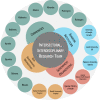Place, displacement, and health-seeking behaviour among the Ugandan Batwa: A qualitative study
- PMID: 38865306
- PMCID: PMC11168611
- DOI: 10.1371/journal.pgph.0003321
Place, displacement, and health-seeking behaviour among the Ugandan Batwa: A qualitative study
Abstract
For many Indigenous Peoples, relationships to the land are inherent in identity and culture, and to all facets of health and wellbeing, physically, emotionally, psychologically, and spiritually. The Batwa are Indigenous Peoples of rural, southwest Uganda who have experienced tremendous social and economic upheaval, due to relatively recent forced displacement and land dispossession. This loss of physical connection to their ancestral lands has significantly impacted Batwa health, and also affected available healthcare options for Batwa. This exploratory study (1) identified and characterized factors that influence Batwa health-seeking behaviour, using acute gastrointestinal illness, a critical public health issue, as a focal point for analysis; and (2) explored possible intersections between the Batwa's connection to place-and displacement-and their health-seeking behaviour for acute gastrointestinal illness. Twenty focus group discussions, stratified by gender, were conducted in ten Batwa settlements in Kanungu District, Uganda and eleven semi-structured interviews were conducted with primary healthcare workers, community health coordinators, clinical officers, and development program coordinators. Qualitative data were thematically analyzed using a constant comparative method. Batwa identified several significant motivators to engage with Indigenous and/or biomedical forms of healthcare, including transition to life outside the forest and their reflections on health in the forest; 'intellectual access' to care and generational knowledge-sharing on the use of Indigenous medicines; and Batwa identity and way of life. These nuanced explanations for health-seeking behaviour underscore the significance of place-and displacement-to Batwa health and wellbeing, and its relationship to their health-seeking behaviour for acute gastrointestinal illness. As such, the results of this study can be used to inform healthcare practice and policy and support the development of a culturally- and contextually-appropriate healthcare system, as well as to reduce the burden of acute gastrointestinal illness among Batwa.
Copyright: © 2024 Brubacher et al. This is an open access article distributed under the terms of the Creative Commons Attribution License, which permits unrestricted use, distribution, and reproduction in any medium, provided the original author and source are credited.
Conflict of interest statement
The authors have declared that no competing interests exist.
Figures



Similar articles
-
'We don't use the same ways to treat the illness:' A qualitative study of heterogeneity in health-seeking behaviour for acute gastrointestinal illness among the Ugandan Batwa.Glob Public Health. 2022 Aug;17(8):1757-1772. doi: 10.1080/17441692.2021.1937273. Epub 2021 Jun 7. Glob Public Health. 2022. PMID: 34097579
-
Factors influencing antenatal care attendance for Bakiga and Indigenous Batwa women in Kanungu District, Southwestern Uganda.Rural Remote Health. 2021 Jul;21(3):6510. doi: 10.22605/RRH6510. Epub 2021 Jul 2. Rural Remote Health. 2021. PMID: 34218663
-
Batwa Indigenous Peoples forced eviction for "Conservation": A qualitative examination on community impacts.PLOS Glob Public Health. 2023 Aug 16;3(8):e0002129. doi: 10.1371/journal.pgph.0002129. eCollection 2023. PLOS Glob Public Health. 2023. PMID: 37585374 Free PMC article.
-
Outcomes from a collaborative project developing and evaluating a community rehabilitation worker program for Northwestern Ontario First Nations.Rural Remote Health. 2023 Jul;23(3):7809. doi: 10.22605/RRH7809. Epub 2023 Jul 11. Rural Remote Health. 2023. PMID: 37429740 Review.
-
Cultural determinants of health for Aboriginal and Torres Strait Islander people - a narrative overview of reviews.Int J Equity Health. 2021 Aug 12;20(1):181. doi: 10.1186/s12939-021-01514-2. Int J Equity Health. 2021. PMID: 34384447 Free PMC article. Review.
References
-
- Richmond CAM, Big-Canoe K. The geographies of Indigenous health. In: Crooks VA, Andrews GJ, Pearce J, editors. Routledge handbook of health geography. London, UK and New York, NY: Routledge, Taylor & Francis; 2018. p. 179–88.
-
- Low SM, Altman I. Place attachment: A conceptual inquiry. New York: Plenum Press; 1992.
-
- Scannell L, Gifford R. Defining place attachment: a tripartite organizing framework. J Environ Psychol. 2010;30(1):1–10.
LinkOut - more resources
Full Text Sources
Research Materials
